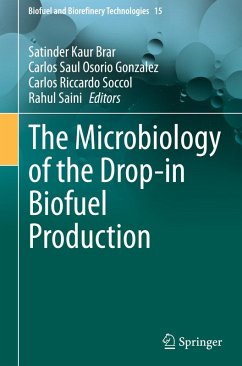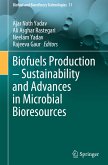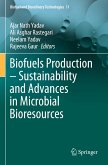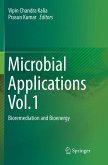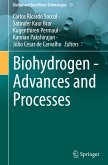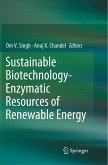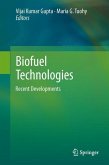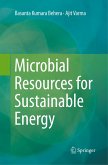The Microbiology of the Drop-in Biofuel Production
Herausgegeben:Brar, Satinder Kaur; Osorio Gonzalez, Carlos Saul; Soccol, Carlos Riccardo; Saini, Rahul
The Microbiology of the Drop-in Biofuel Production
Herausgegeben:Brar, Satinder Kaur; Osorio Gonzalez, Carlos Saul; Soccol, Carlos Riccardo; Saini, Rahul
- Gebundenes Buch
- Merkliste
- Auf die Merkliste
- Bewerten Bewerten
- Teilen
- Produkt teilen
- Produkterinnerung
- Produkterinnerung
The Microbiology of the Drop-in Biofuel Production is a comprehensive resource that provides basic and applied knowledge, technologies, and regulations of current drop-in biofuel production. This book focuses on liquid drop-in biofuel produced trough biochemical process and all the important aspect like renewable substrates, biochemical routes, genetic modifications, technology innovations, regulation, commercialization as well as the future perspectives to be implemented. Starting with an introductory chapter about the conventional methods to produce drop-in biofuels, the book will guide the…mehr
Andere Kunden interessierten sich auch für
![Biofuels Production - Sustainability and Advances in Microbial Bioresources Biofuels Production - Sustainability and Advances in Microbial Bioresources]() Biofuels Production - Sustainability and Advances in Microbial Bioresources77,99 €
Biofuels Production - Sustainability and Advances in Microbial Bioresources77,99 €![Biofuels Production - Sustainability and Advances in Microbial Bioresources Biofuels Production - Sustainability and Advances in Microbial Bioresources]() Biofuels Production - Sustainability and Advances in Microbial Bioresources77,99 €
Biofuels Production - Sustainability and Advances in Microbial Bioresources77,99 €![Microbial Applications Vol.1 Microbial Applications Vol.1]() Microbial Applications Vol.1116,99 €
Microbial Applications Vol.1116,99 €![Biohydrogen - Advances and Processes Biohydrogen - Advances and Processes]() Biohydrogen - Advances and Processes171,99 €
Biohydrogen - Advances and Processes171,99 €![Sustainable Biotechnology- Enzymatic Resources of Renewable Energy Sustainable Biotechnology- Enzymatic Resources of Renewable Energy]() Sustainable Biotechnology- Enzymatic Resources of Renewable Energy77,99 €
Sustainable Biotechnology- Enzymatic Resources of Renewable Energy77,99 €![Biofuel Technologies Biofuel Technologies]() Biofuel Technologies154,99 €
Biofuel Technologies154,99 €![Microbial Resources for Sustainable Energy Microbial Resources for Sustainable Energy]() Basanta Kumara BeheraMicrobial Resources for Sustainable Energy77,99 €
Basanta Kumara BeheraMicrobial Resources for Sustainable Energy77,99 €-
-
-
The Microbiology of the Drop-in Biofuel Production is a comprehensive resource that provides basic and applied knowledge, technologies, and regulations of current drop-in biofuel production. This book focuses on liquid drop-in biofuel produced trough biochemical process and all the important aspect like renewable substrates, biochemical routes, genetic modifications, technology innovations, regulation, commercialization as well as the future perspectives to be implemented. Starting with an introductory chapter about the conventional methods to produce drop-in biofuels, the book will guide the reader into the specific biochemical processes for its production, covering aspect like renewable feedstocks, microorganism, classification, and the circular economy around all the production process.
This book provides a detailed overview about the microbiology, regulation and commercialization aspects of drop-in biofuel production and is essential for researchers, students, and professors working in the bioenergy area.
This book provides a detailed overview about the microbiology, regulation and commercialization aspects of drop-in biofuel production and is essential for researchers, students, and professors working in the bioenergy area.
Produktdetails
- Produktdetails
- Biofuel and Biorefinery Technologies 15
- Verlag: Springer / Springer Nature Switzerland / Springer, Berlin
- Artikelnr. des Verlages: 978-3-031-61636-5
- 2024
- Seitenzahl: 456
- Erscheinungstermin: 9. August 2024
- Englisch
- Abmessung: 241mm x 160mm x 30mm
- Gewicht: 789g
- ISBN-13: 9783031616365
- ISBN-10: 3031616367
- Artikelnr.: 70446400
- Herstellerkennzeichnung Die Herstellerinformationen sind derzeit nicht verfügbar.
- Biofuel and Biorefinery Technologies 15
- Verlag: Springer / Springer Nature Switzerland / Springer, Berlin
- Artikelnr. des Verlages: 978-3-031-61636-5
- 2024
- Seitenzahl: 456
- Erscheinungstermin: 9. August 2024
- Englisch
- Abmessung: 241mm x 160mm x 30mm
- Gewicht: 789g
- ISBN-13: 9783031616365
- ISBN-10: 3031616367
- Artikelnr.: 70446400
- Herstellerkennzeichnung Die Herstellerinformationen sind derzeit nicht verfügbar.
Prof. Satinder Kaur Brar is the James and Joanne Love Chair in Environmental Engineering and Director of One WATER Institute at York University. Her research is on the intersecting areas of environmental engineering and its impact on the overall well-being of the global community. She primarily works in the two converging fields of value-addition of wastes and removal of emerging contaminants. Many national and international awards and honors have been bestowed on her that prove her research mettle. Notable ones being, in 2021, Best paper award, and in 2019, Eddy Principles/Processes Wastewater Medal winner, honored by the Water Environment Federation; in 2017, her research on "Novel and Advanced Hybrid Oxidation and Enzymatic Technologies for Emerging Trace Environmental Contaminants" were awarded the Grand Prize in University Research for Excellence in Environmental Engineering and Science by the American Academy of Environmental Engineers and Scientists (AAEES). She was recently inducted into the European Academy of Sciences in 2021 and as well is a member of the College of New Scholars, Scientist and Artists of the Royal Society of Canada, since 2014. She leads the Bioprocessing and NanoEnzyme Formulation Facility (BANEFF) at York University and this unit has successfully led to the training of 72 HQP (including 45 undergraduates and summer interns). Currently, she is supervising 4 PDFs, 2 research associates, one research assistant, 11 Ph.D.s and 2 M.Scs. She has published more than 400 articles, edited 12 books and at least 55 invited talks to her credit. Dr. Carlos Saul Osorio-Gonzalez is a Postdoctoral Fellow in the Civil Engineering Department at York University, Ontario, Canada. His research interest mainly lies in residues valorization, bioenergy production, fermentation technology, sustainability, and biorefinery. Some of his specific research area includes biofuels, enzyme and secondary metabolite production, wastewater treatment, bioremediation and apply statistics. He has been held with several awards and scholarships such as Merit Scholarship Program for Foreign Students-Short-term (PBEEE-3M), Bourses de 2è et 3è cycle pour stage en Centre collégial de transfert de technologies (CCTT), Mitacs Research Award and Mitacs Elevate. He has more than dozen research publications and book chapters in international peer-reviewed journals and books. Prof. Carlos Ricardo Soccol has a degree in Chemical Engineering from the Federal University of Paraná (1979), a PhD in Enzymatic Genetics, Microbiology and Bioconversion - Universite de Technologie de Compiègne-France (1992). Postdoctoral studies at the Institut ORSTOM/IRD- Montpellier, France (1994 and 1997) and Aix-Marseille Université, France (2000).Biotechnology Business, Germany (2005). English as a Medium of Instruction (EMI) -Teacher Education Programme, University of Oxford-UK (2014). Mentor of the First Undergraduate Course in Bioprocess Engineering and Biotechnology in Brazil (2000) and of the Postgraduate Programme in Bioprocess Engineering and Biotechnology, Master's and Doctorate level (1997) at the Federal University of Paraná. Mentor of the Centre for Agroindustrial and Agrifood Biotechnology of Paraná-CENBAPAR (2004). Mentor of the country's first Post-Medium Course in Industrial Bioprocesses and Biotechnology - SENAI-Parana (2008). 10 Parana Science and Technology Award (1996). Best Scientific Achievement of the Year 2001 by Ministry of Sugar of Cuba (MINAZ). Scopus/Elsevier Award (2009). Doctor Honoris Causa Université Blaise Pascal-France (2010), Outstanding Scientist Award- 5th International Conference on Industrial Bioprocesses, Taipei-Taiwan (2012). Elected Full Member of the Brazilian Academy of Sciences - Engineering Area (2013). Henri Nestlé Prize in Food Science and Technology (2014). Polytech-Reseau Écoles d'Ingénieurs de France Medal (Paris 2015). Medal and Diploma of Merit, CREA-PR (2016). Scientific and Technological Merit, Legislative Assembly of the State of Paraná (2016). Scientist of the Year - Nanocell Institute (2017), Order of Scientific Merit - Commander Class, MCTIC/ Brazil Presidency of the Republic (2018).The IBA Felow- Mexico (2021). Full Professor of Industrial Biotechnology at the Federal University of Paraná and HDR Professor - École Supériure D'Ingénieurs de Luminy, Aix-Marseille Université-France. Visiting Professor École Polyttechnique Fédérale de Lausanne, Switzerland (2009-2010) . Visiting Professor Université Lille 1-France (2014). Visiting Professor Université Blaise Pascal - École Polyttechnique-Clermont-Ferrand, France (2015). Coordinator (Master BIODEV) Unesco International Master in Biotechnology (2004-2020). Editor, Journal Biotechnology Research and Innovation. Associated Editor, Nanotechnology for Environmental Engineering, Systems Microbiology and Biomanufacturing. Technical and scientific advisor to various companies, funding agencies and scientific journals in Brazil and abroad. Full Member of the CA-Biotecnologia CAPES (2010-2013). Full Member CA-Biotecnologia CNPq (2012-2015). Vice-Chairman/Central Council International Bioprocess Association (2021-2024 ). Vice-President Brazilian Biotechnology Association (2021 - ) Has experience in Industrial Biotechnology, with an emphasis on the following specialities: Bioprocess Engineering and Applied Biotechnology (Agriculture, Human Health, Animal Health, Industrial Biotechnology, Cosmetics, Environment and Bioenergy). Scale-up of Bioprocesses (Bench, Pilot and Industrial). Bioseparation Engineering, Tissue Culture. Plant projects for biotechnology industries. Bioproduction, among others. He also has experience in transferring technologies to the production sector. To date, he has supervised 25 postdoctoral fellows, 93 doctors, 132 masters and has 1.472 publications/communications, including 34 books, 210 book chapters, 530 full articles published in periodicals, 185 full papers published in event proceedings, 397 abstracts published in event proceedings. He has registered 116 patents, several of which are with companies and have been licensed. His research articles have been cited more than 43,500 times in the Google Scholar Citations database, with an H factor of 101. Dr. Rahul Saini is currently working as Post-Doctorate at Lassonde School of Engineering, York University, Ontario, Canada. He is currently working on optimizing the method for enhanced conversion of pulp waste into Renewable Natural gas. His main research interest is in fermentation, bioremediation, value addition and waste valorization into renewable and sustainable compounds. He has published several scientific research and review articles in international peer-reviewed journals and authored review articles as well as many book chapters. Additionally, he has received numerous awards and scholarships such as Graduate Aptitude Test and Engineering, Life Science (JRF/LS), MITACS research award and MITACS Elevate Postdoctoral Fellowship.
Chapter 1: Biofuels: Opportunities, Challenges, Risks, and Sustainability.- Chapter 2: The current prospect of Drop-in biofuel production through biochemical routes.- Chapter 3: Renewable residues as feedstock for drop-in biofuel production.- Chapter 4: Microalgal based drop-in biofuel production.- Chapter 5: Yeast-based Drop-in Biofuels.- Chapter 6: Bacterial based drop-in biofuel production.- Chapter 7: Drop-in biofuel production using fungi.- Chapter 8: Sustainable aviation fuel production.- Chapter 9: Microbial isoprenoids as drop-in biofuel.- Chapter 10: Microbial alkane/alkene as drop-in biofuel.- Chapter 11: Downstream processing of drop-in biofuels.- Chapter 12: Recent advances in genetic and metabolic engineering for drop-in biofuel production.- Chapter 13: Drop in biofuel production: An environmental assessment perspective.- Chapter 14: Currently and future legislation in drop-in biofuel production.- Chapter 15: The future of the microbial-based drop-in biofuel commercialization.
Chapter 1: Biofuels: Opportunities, Challenges, Risks, and Sustainability.- Chapter 2: The current prospect of Drop-in biofuel production through biochemical routes.- Chapter 3: Renewable residues as feedstock for drop-in biofuel production.- Chapter 4: Microalgal based drop-in biofuel production.- Chapter 5: Yeast-based Drop-in Biofuels.- Chapter 6: Bacterial based drop-in biofuel production.- Chapter 7: Drop-in biofuel production using fungi.- Chapter 8: Sustainable aviation fuel production.- Chapter 9: Microbial isoprenoids as drop-in biofuel.- Chapter 10: Microbial alkane/alkene as drop-in biofuel.- Chapter 11: Downstream processing of drop-in biofuels.- Chapter 12: Recent advances in genetic and metabolic engineering for drop-in biofuel production.- Chapter 13: Drop in biofuel production: An environmental assessment perspective.- Chapter 14: Currently and future legislation in drop-in biofuel production.- Chapter 15: The future of the microbial-based drop-in biofuel commercialization.

